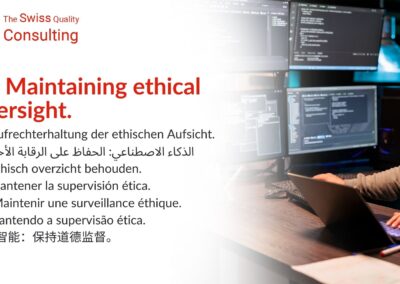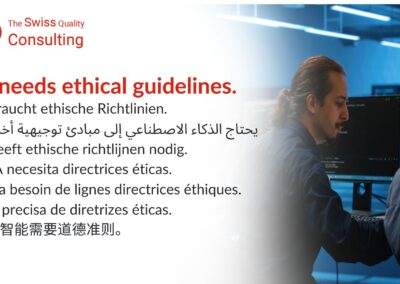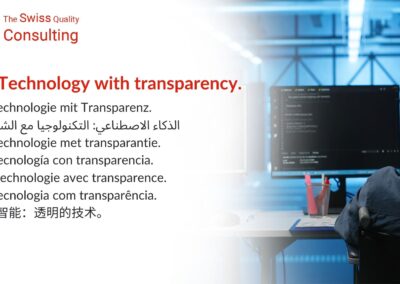Establishing Ethical Guidelines for Data and Technology
Understanding the Need for Ethical Guidelines
Ethical guidelines for responsible data and technology use are essential for organizations aiming to navigate the complexities of modern technological advancements. As businesses increasingly rely on Artificial Intelligence (AI), Blockchain, and other advanced technologies, the potential for misuse and ethical breaches grows. In regions like Saudi Arabia and the UAE, where technological innovation is rapidly advancing, establishing robust ethical guidelines ensures that organizations uphold the highest standards of data privacy and integrity. These guidelines provide a framework for the ethical collection, storage, and utilization of data, promoting trust and transparency among stakeholders.
Integrating Ethical Guidelines into Business Operations
To effectively implement ethical guidelines, organizations must integrate them into every aspect of their operations. This involves developing comprehensive policies that address data privacy, security, and the ethical use of technology. In cities like Riyadh and Dubai, where businesses are at the forefront of technological adoption, these policies must be tailored to meet local regulations and cultural expectations. Ethical guidelines should be embedded into the organizational culture, with regular training and awareness programs to ensure that all employees understand and adhere to these standards. By fostering an environment of ethical awareness, businesses can mitigate risks and enhance their reputation.
Utilizing Blockchain for Ethical Data Management
Blockchain technology can play a pivotal role in ensuring ethical data management. By leveraging blockchain, organizations can create immutable records of data transactions, enhancing transparency and accountability. In the UAE and Saudi Arabia, where blockchain adoption is growing, this technology can support the ethical handling of data by providing a secure and transparent framework. Blockchain can also facilitate compliance with data protection regulations, ensuring that organizations adhere to legal and ethical standards. Implementing blockchain in data management processes aligns with ethical guidelines, promoting trust and integrity in business operations.
Promoting Ethical Use of Technology in Business Practices
Leadership and Executive Coaching for Ethical Technology Use
Effective leadership is crucial for promoting the ethical use of technology within organizations. Business executives and mid-level managers in Saudi Arabia and the UAE must be equipped with the knowledge and skills to navigate the ethical challenges posed by modern technology. Executive coaching services can provide the necessary guidance, helping leaders to understand the ethical implications of their decisions and actions. By prioritizing ethical considerations in strategic planning and decision-making, leaders can ensure that their organizations develop and deploy technology in ways that benefit society while minimizing potential harm.
Project Management for Ethical Technology Implementation
Project management is essential for ensuring that technology implementation projects adhere to ethical guidelines. In regions like Riyadh and Dubai, where large-scale technological projects are common, robust project management practices are necessary to integrate ethical considerations into every phase of the project lifecycle. This includes conducting ethical impact assessments, engaging diverse stakeholders, and continuously monitoring compliance with ethical standards. Effective project management ensures that technological innovations are developed and implemented responsibly, aligning with organizational values and ethical guidelines.
The Role of The Metaverse in Ethical Technology Use
The Metaverse, an emerging digital ecosystem, presents new opportunities and challenges for ethical technology use. In forward-thinking regions like the UAE and Saudi Arabia, the development of the Metaverse can enhance business practices and consumer experiences. However, it also requires careful consideration of ethical guidelines to prevent misuse and ensure inclusivity. Organizations must develop ethical frameworks that address issues such as digital rights, privacy, and data security within the Metaverse. By proactively addressing these ethical considerations, businesses can create a digital environment that promotes fairness, transparency, and respect for all users.
Conclusion
Implementing ethical guidelines for responsible data and technology use is crucial for organizations in the modern technological landscape. In regions like Saudi Arabia, the UAE, Riyadh, and Dubai, integrating these guidelines into business operations can enhance trust, transparency, and compliance with regulatory standards. Effective leadership, supported by executive coaching and robust project management, is essential for navigating the ethical challenges of technology adoption. By leveraging technologies such as blockchain and considering the ethical implications of new digital ecosystems like the Metaverse, businesses can ensure that their technological advancements benefit society while upholding the highest ethical standards. Embracing ethical guidelines in data and technology use will lead to more responsible and sustainable business practices, contributing to long-term success and societal well-being.
—
#EthicalGuidelines #ResponsibleDataUse #Technology #DataPrivacy #ArtificialIntelligence #Blockchain #Metaverse #ExecutiveCoaching #GenerativeAI #ModernTechnology #BusinessSuccess #LeadershipSkills #ManagementSkills #ProjectManagement #SaudiArabia #UAE #Riyadh #Dubai























